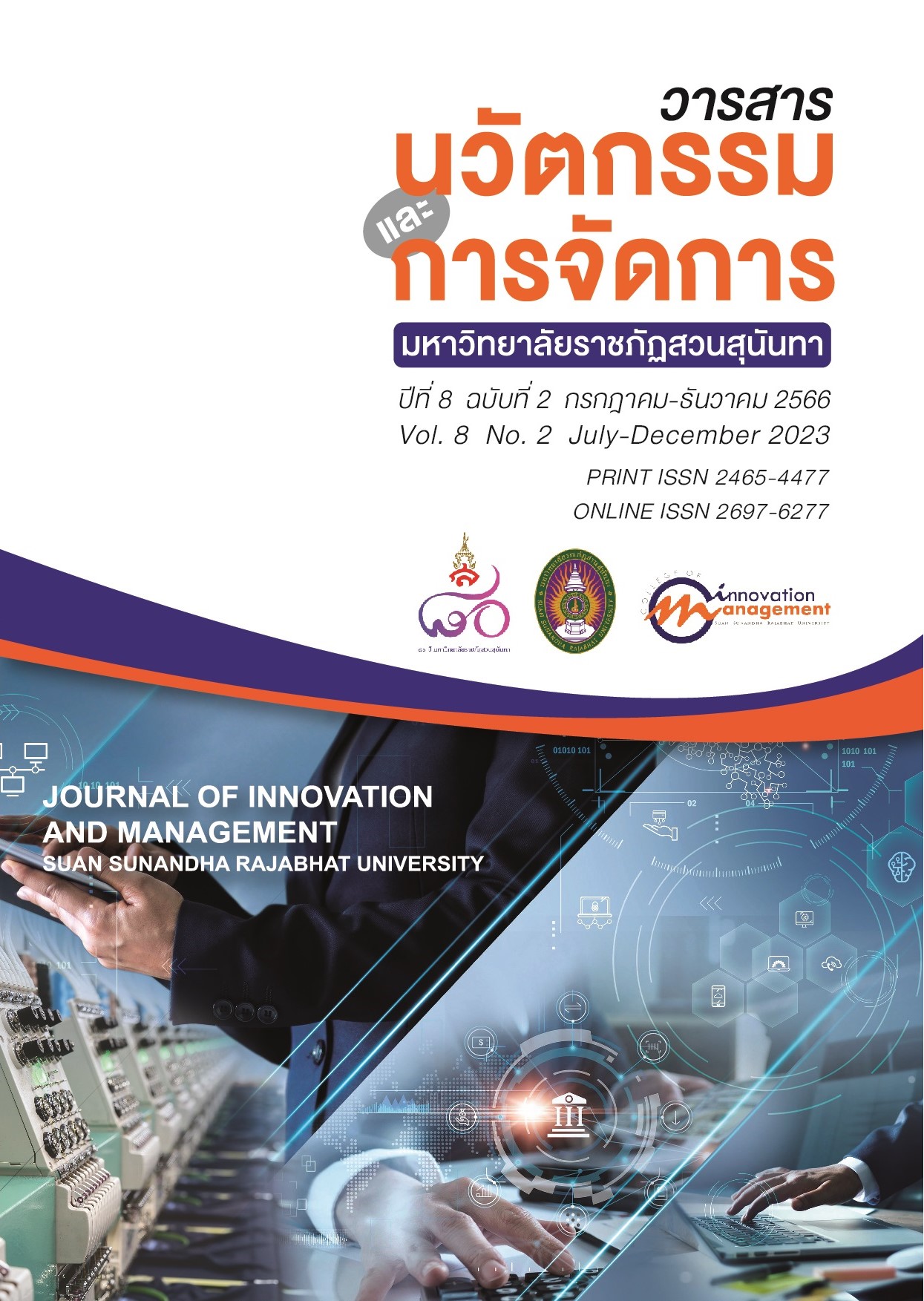Politics of Agriculturalist Groups in the Eastern Suburban Areas of Bangkok Metropolis
Keywords:
Political Environments, Political Network, FarmerAbstract
This research aims to study (1) factors affecting the emergence of farmer groups, (2) the political networks of farmer groups, and (3) the politics of farmer groups in the eastern suburbs of Bangkok using analytical research. The qualitative research consisted of in-depth interviews with 17 farmer group leaders and group members and document data analysis. The results of the research include factors affecting the emergence of farmer groups in the eastern suburbs of Bangkok, including (1) economic factors in terms of decreased income, lack of liquidity for households, and higher input costs but lower output prices, thus being an adjustment for survival, (2) support from government agencies in areas under operation according to government policy, and (3) economic development of farmer groups to gain strength, especially the establishment of community enterprise groups. Both formal and informal gatherings characterize the political networks of farmer groups. Formal networks result from operations under the rules and regulations of the district authority responsible for the area. The group’s activities will be following the rules and the staff’s project support. The politics of agricultural groups in the eastern suburbs of Bangkok result from transforming agricultural areas into housing development communities and the community economy into an industrial economy. The integration of farmer groups is not the result of the farmers’ initiative. Still, it arises mainly because of economic benefits such as survival together with the encouragement and support of the Agricultural Office Area 1, Department of Agricultural Extension and Cooperatives, Ministry of Agriculture and Cooperatives, and the Bangkok District Office, which has responsibilities under the driving force of government policies and projects such as large plot farmer project of community enterprise group. The conditions for agricultural groups to operate according to the requirements of the government and government agencies indicate the use of politics as a tool for negotiating to obtain projects and budgets from government agencies, which is the primary goal of grouping together.
References
Akram-Lodhi, A. H., and Kay, C. (2009). Peasants and Globalization: Political economy, rural transformation and the agrarian question. London: Routledge.
Damsri, W. and Ruikaew, P. (1997). Rice culture and power around Songkhla Lake. Bangkok: Thailand Research Fund (TRF). (in Thai)
Dijk, J.V. (2006). The network society. London: SAGE.
Gramsci, A. (1971). Selections from the Prison Notebooks. Edited and translated by Quintin Hoare and Geoffrey Nowell Smith. London: Lawrence and Wishart.
Khlong Sam Wa District Office. (2022). Khlong Sam Wa land use zone. Khlong Sam Wa Subdistrict, Khlong Sam Wa District. Bangkok: Land Development Office District 1, Department of Land Development Ministry of Agriculture and Cooperatives. (in Thai)
Lao-an, T. (2010). Economic changes of "farmer society" Isan since B.E. 1957-2007: Case study of University, 5(2), 1-30. (in Thai)
Minburi District Office. (2022). Minburi Land Use Area, Saen Saep Subdistrict, Minburi District. Bangkok: Office Land Development Zone 1, Department of Land Development Ministry of Agriculture and Cooperatives. (in Thai)
Natsupha, C. (1997). Thai culture and social change movements. 4th ed. Bangkok: Chulalongkorn University. (in Thai)
Nong Chok District Office. (2022). Nong Chok Land Use Area, Nong Chok Subdistrict, Nong Chok District. Bangkok: Land Development Office Zone 1, Department of Land Development Ministry of Agriculture and Cooperatives. (in Thai)
Prasertkul, S. (2005). Public politics in Thai democracy. Bangkok: Amarin. (in Thai)
Puangngam, K. (2010). Components of community and locality. Bangkok: Bophit Pim. (in Thai)
Pintoptaeng, P. and Bunchai, K. (2003). Tactics of the poor and policy struggle. Lessons and experiences of social movements. and politics of the public sector in the period after the economic crisis (1997-2002). [Online]. Retrieved 2 September 2016, from: http://v1.midnightuniv.org/midfrontpage/newpage82.html (in Thai)
Sri Suan Taeng, S. (2007). Farmers’ wisdom and learning process: a case study of changing through the agricultural system in the Chao Phraya lowlands on the western side. Thesis of the Degree of Doctor of Liberal Arts Program in Vocational Education. Bangkok: Kasetsart University. (in Thai)
Sirichai, L. (1995). Land loss and farmers’ occupational response: a case study. Villages in the Central Region. Thesis of the Degree of Doctor of Education Program in Development Studies. Bangkok: Srinakharinwirot University Prasarnmit. (in Thai)
Thaothawin, P. (2008). The existence of a peasant society: a case study of debt problems in Chan Village City. Journal of Liberal Arts Ubon Ratchathani University, 4(5), 3-12. (in Thai)
Downloads
Published
How to Cite
Issue
Section
License
Copyright (c) 2023 Journal of Innovation and Management

This work is licensed under a Creative Commons Attribution-NonCommercial-NoDerivatives 4.0 International License.
See Publication Ethics https://so03.tci-thaijo.org/index.php/journalcim/Ethics






